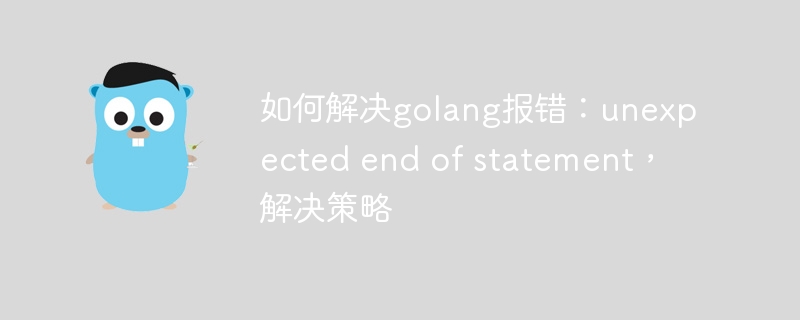Home >Backend Development >Golang >How to solve golang error: unexpected end of statement, solution strategy
How to solve golang error: unexpected end of statement, solution strategy
- WBOYWBOYWBOYWBOYWBOYWBOYWBOYWBOYWBOYWBOYWBOYWBOYWBOriginal
- 2023-08-25 18:55:441533browse

How to solve golang error: unexpected end of statement, solution strategy
When learning and using the Golang programming language, we may encounter various problems and errors. One of the common errors is: unexpected end of statement (meaning unexpected end of statement). This error usually occurs when we make some syntax errors when writing code, causing the compiler to fail to parse the code correctly. This article will discuss resolution strategies for this error and provide some code examples to help readers better understand.
First of all, we need to understand the cause of this error. When we write code, if we forget to add a necessary syntax element, or if necessary symbols (such as semicolons, brackets, etc.) are missing somewhere in the code, the compiler will not be able to parse the code correctly and will throw " unexpected end of statement" error. Here are some common situations that cause this error:
-
Missing semicolon:
package main import "fmt" func main() { fmt.Println("Hello, World!") } // 缺少分号 -
Unclosed brackets:
package main import "fmt" func main() { fmt.Println("Hello, World!" // 缺少右括号 } -
Unclosed quotation marks:
package main import "fmt" func main() { fmt.Println("Hello, World!) // 引号未闭合 }
The key to solving this error is to find the problem in the code according to the error prompt and make the corresponding repair. Here are some common strategies to solve this error:
Strategy 1: Check the code structure
First, we need to carefully check whether our code structure conforms to Golang's grammar rules. For example, check whether necessary brackets, semicolons, etc. are missing.
Strategy 2: Read the error message carefully
When the compiler throws an "unexpected end of statement" error, we should read the error message carefully. The error message usually tells us the number of lines in error and the specific cause of the error. By carefully reading the error message, we can better understand the problem and fix it accordingly.
Strategy 3: Check quote closure
In Golang, strings need to be wrapped in double quotes or backticks. If we miss the closing quotes, it will result in "unexpected end of statement" error. Therefore, we need to check that the quotes in our code are closed correctly.
Strategy 4: Avoid excessive indentation
Excessive indentation may also cause "unexpected end of statement" errors. Therefore, when we encounter this error, we should check our code for excessive indentation.
Here is some sample code to fix this error:
package main
import "fmt"
func main() {
fmt.Println("Hello, World!")
}In the above sample code, we added the missing closing bracket, thus fixing the "unexpected end of statement" error.
package main
import "fmt"
func main() {
fmt.Println("Hello, World!")
}In the above example, we fixed the problem of unclosed quotes, thus solving the "unexpected end of statement" error.
When dealing with "unexpected end of statement" errors, we should have a deep understanding of Golang's syntax rules and carefully check our code structure. By carefully reading the error message, we can better understand the problem and resolve the error with appropriate repair strategies. I hope this article can provide some help to readers in solving this problem.
The above is the detailed content of How to solve golang error: unexpected end of statement, solution strategy. For more information, please follow other related articles on the PHP Chinese website!

